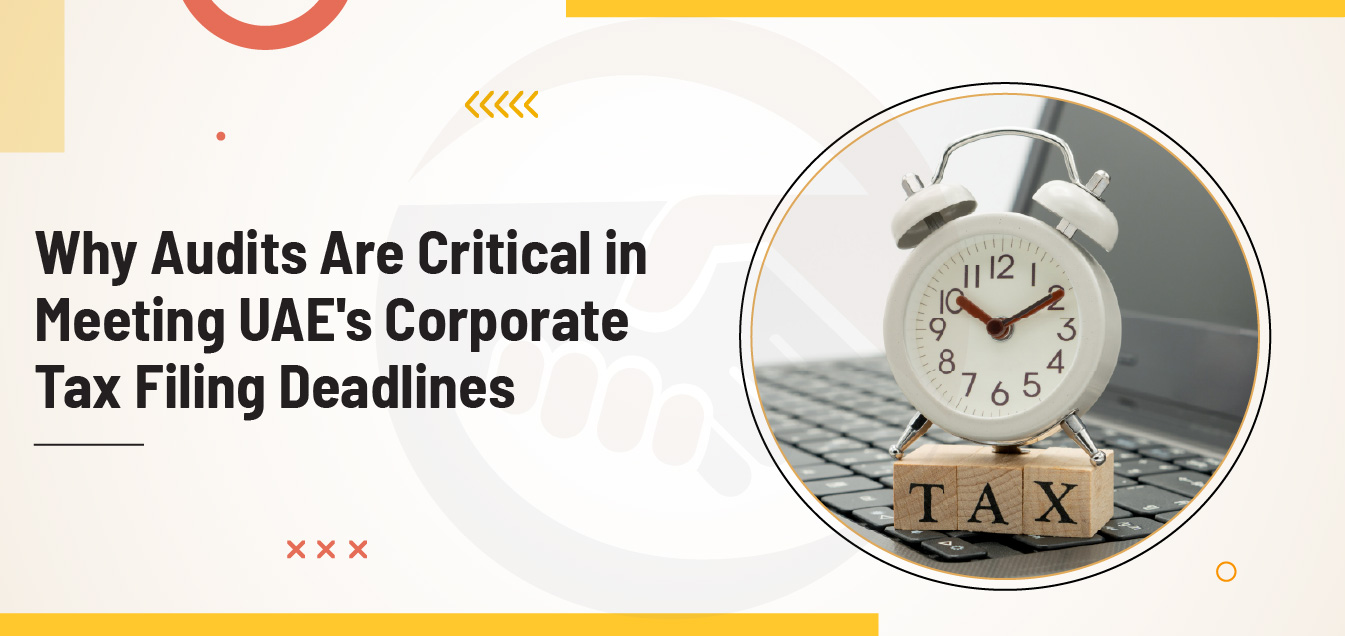
05 Jan 2023
United Arab Emirates (UAE’s) Ministry of Finance has formally issued Corporate Tax Law to provide a legislative guide to introduce and implement Corporate Tax (CT) in UAE. The law applies to a taxable person/entity whose financial year starts on or after 1st June 2023.
The applicable tax rate is 9% on taxable income above AED 375,000. To calculate this taxable income, the accounting income shall be adjusted for certain transactions and elements covered by article 20 of CT Law.
Once applied to an entity, the next concern might be, “What is the tax period?”. The tax period for which the tax return is to be filed, whereas the financial year is a 12-month period for which a taxable person prepares its financial statements.
The due date for a tax return would be 9 months from the end of a tax period. The liability arising from the tax return is also due at the "same time, i.e. has to be sd within 9 months from the end of a tax year.
The authority publishes that it may request a taxable person to submit their underlying financial statements, which are used for determining the taxable income for a tax period. However, it highlights the need for a taxable person to prepare and maintain audited and certified financial statements. The authority further requires maintaining the underlying records for 7 years from the end of a tax period.
In general, government-owned or controlled entities, extractive businesses (with a right to extract), non-extractive natural resource businesses, qualifying public benefit entities and qualifying investment funds are exempt from corporate tax concerning certain conditions. An exemption is also given to an investment manager acting on behalf of a non-resident person, provided certain conditions are met.
A taxable person can be a resident or a non-resident person. A resident person can be an entity with a fixed or permanent establishment in the UAE (including mainland and freezone), an entity established outside the UAE but effectively controlled or managed by the UAE, or a natural person who conducts business in the UAE. A non-resident is not a resident, either has a permanent establishment in UAE, generates income from UAE or has a nexus in UAE. Once an entity or person is identified as a “taxable person”, the next concern is to know the corporate tax base for figuring out respective taxes.
| Definition | Corporate Tax Base | ||
|---|---|---|---|
|
Taxable Person |
Resident Person (Mainland+ Freezone) |
Juridical Person established in UAE |
All Taxable Income generated from UAE or outside UAE |
|
Natural Person |
Income derived from UAE or outside UAE which relates to the business activity conducted in UAE |
||
|
Non-Resident Person |
One with a permanent establishment in UAE |
Part of Taxable Income attributable to an establishment in UAE |
|
|
Generates UAE Sourced Income |
Income generated within UAE, not attributable to a permanent establishment in UAE |
||
|
The one with a nexus in UAE |
Taxable income attributable to the nexus. |
The income generated within UAE can include income from sales of goods or services, capital investment, movable/immovable property, sale of shares/capital of residents, intellectual property, interest income or insurance income.
Accounting income for the year can be adjusted to calculate taxable income. The required adjustments that need to be made might include
- Unrealized gains and losses
- Exempt income,
- Reliefs
- Deductions
- Transactions with related parties,
- Tax loss relief,
- Incentive/relief for qualifying business activity.
The law relieves small businesses if their taxable income does not exceed the threshold of AED 375,000 during the tax period and all previous tax periods. However, it reserves the right to verify the same. Therefore, it is recommended to keep records in all instances.
Dividend income, income from participating interests, income from foreign permanent establishment and income from non-residents operating aircraft or ships as part of international transportation are all exempt for corporate tax purposes.
Other imperative aspects covered by the law are summarised as follows:
- Contrary to the suggestions in the initial suggestion paper released in early 2022, Real Estate is not exempt.
- Tax Grouping of Freezone entity with Mainland entity is disallowed unless Freezone entity elects to be taxed @ 9%. Tax Grouping is allowed only if all the entities are juridical persons, own 95% or more in another person, and the financial statements follow the same financial year.
- Reliefs are given for gain/loss on the transfer of assets within qualifying tax groups and business restructuring.
- Deductible Expenses include the business’s revenue expenses, those incurred for deriving taxable income, Net interest expenses up to 30% of EBITDA & remaining can be carried forward for 10 tax periods and 50% of entertainment expenses (including meals, accommodation, transportation, or admission etc.)
- For considering transactions with related parties, it is a must to have these transactions on an arm’s length basis where the arm’s length can be determined by applying comparable uncontrolled price method, resale price method, cost-plus method, transactional net margin method, or transactional profit split method.
- Foreign tax credit can only be used to settle a corporate tax liability for the period and cannot be carried forward.
- Tax losses can only be carried forward as a deduction in taxable income and can only set off up to 75% of taxable income for a period.

.jpg)

.jpg)
.jpg)